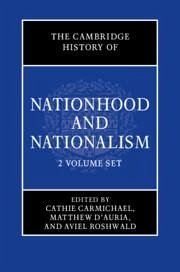
The Cambridge History of Nationhood and Nationalism 2 Volume Hardback Set
Versandkostenfrei!
Versandfertig in über 4 Wochen
255,99 €
inkl. MwSt.

PAYBACK Punkte
128 °P sammeln!
The origins and nature of nationhood and nationalism continue to be topics of heated scholarly debate. This major new reference work with contributions from an international team of scholars provides a comprehensive account of ideas and practices of nationhood and nationalism from antiquity to the present. It considers both continuities and discontinuities, engaging critically and analytically with the scholarly literature in the field. The History also explores nationhood and nationalism's relationships with a wide variety of cultural practices and social institutions, in addition to the phen...
The origins and nature of nationhood and nationalism continue to be topics of heated scholarly debate. This major new reference work with contributions from an international team of scholars provides a comprehensive account of ideas and practices of nationhood and nationalism from antiquity to the present. It considers both continuities and discontinuities, engaging critically and analytically with the scholarly literature in the field. The History also explores nationhood and nationalism's relationships with a wide variety of cultural practices and social institutions, in addition to the phenomenon's crucial political dimensions. Its wide range of regional case studies brings a truly global, comparative perspective to a field long constrained by Eurocentric assumptions. Volume I tracks turning points in the history of nationhood and nationalism from ancient times to the twentieth century. Volume II theorizes the connections between nationhood/nationalism and ideology, religion and culture. Together, they enable readers to understand the roots of how nationhood and nationalism function in the present day.


